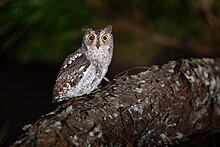Oriental scops owl
| Oriental scops owl | |
|---|---|

| |
| Scientific classification | |
| Domain: | Eukaryota |
| Kingdom: | Animalia |
| Phylum: | Chordata |
| Class: | Aves |
| Order: | Strigiformes |
| Family: | Strigidae |
| Genus: | Otus |
| Species: | O. sunia
|
| Binomial name | |
| Otus sunia (Hodgson, 1836)
| |
The oriental scops owl (Otus sunia) is a species of scops owl found in eastern and southern Asia.
Description[edit]
This is a small, variably plumaged, yellow-eyed owl with ear-tufts which are not always erect. It can be distinguished from the collared scops owl by its whitish scapular stripe, well-marked underparts, and lack of pale collar. There are two colour morphs, grey and rufous; intermediate forms also occur. Sexes are similar in appearance. Individuals may freeze with eyes half-closed when disturbed. The species has a repeated liquid call sounding like "tuk tok torok".[2] Adults have higher-pitched calls than juveniles.[3]
Distribution and habitat[edit]
The species has an extremely wide distribution across eastern and southern Asia, and is found in dry deciduous forests from Russia to Thailand. The owl nests in holes in trees, especially Mahua trees,[3] during February–April.[1]
References[edit]
- ^ a b c BirdLife International (2021). "Otus sunia". IUCN Red List of Threatened Species. 2021: e.T22728969A206482277. doi:10.2305/IUCN.UK.2021-3.RLTS.T22728969A206482277.en. Retrieved 14 February 2022.
- ^ "Oriental Scops-owl (Otus sunia)". Handbook of the Birds of the World. Retrieved 4 April 2018.
- ^ a b Bharos, A. M. K.; Naidu, Ravi; Mandavia, Ameet; Bharos, Akhilesh; Vishwakarma, Anurag (2023-01-12). "The avian diversity of Deccan/ Western Bastar Plateau, Bastar Division, Chhattisgarh". doi:10.21203/rs.3.rs-2456376/v1. Retrieved 2023-10-15.


